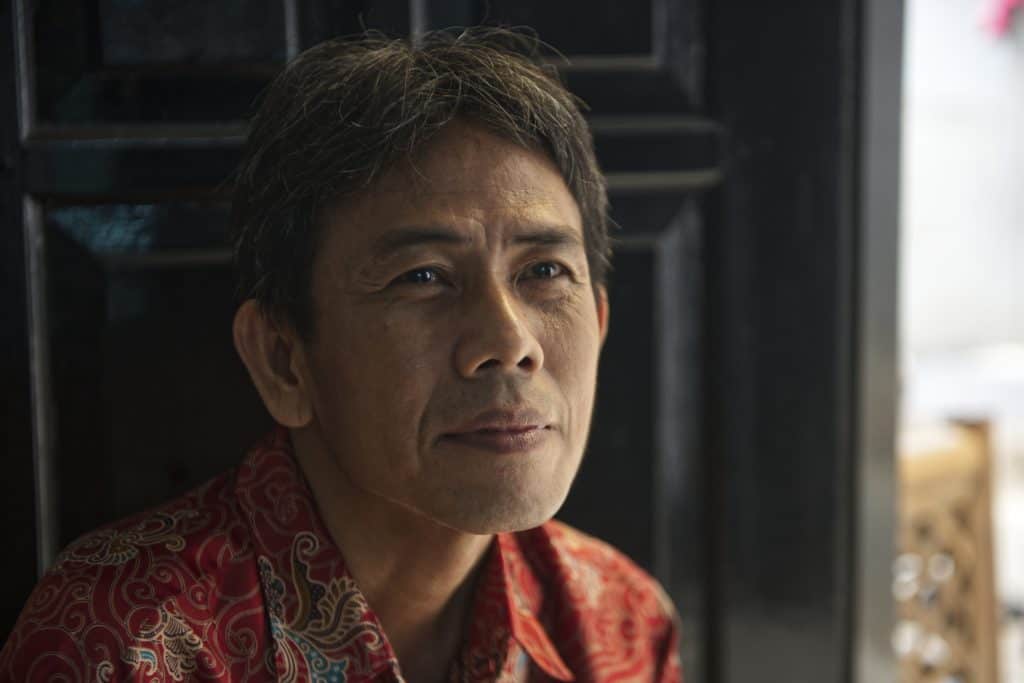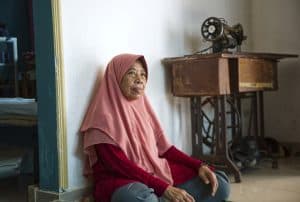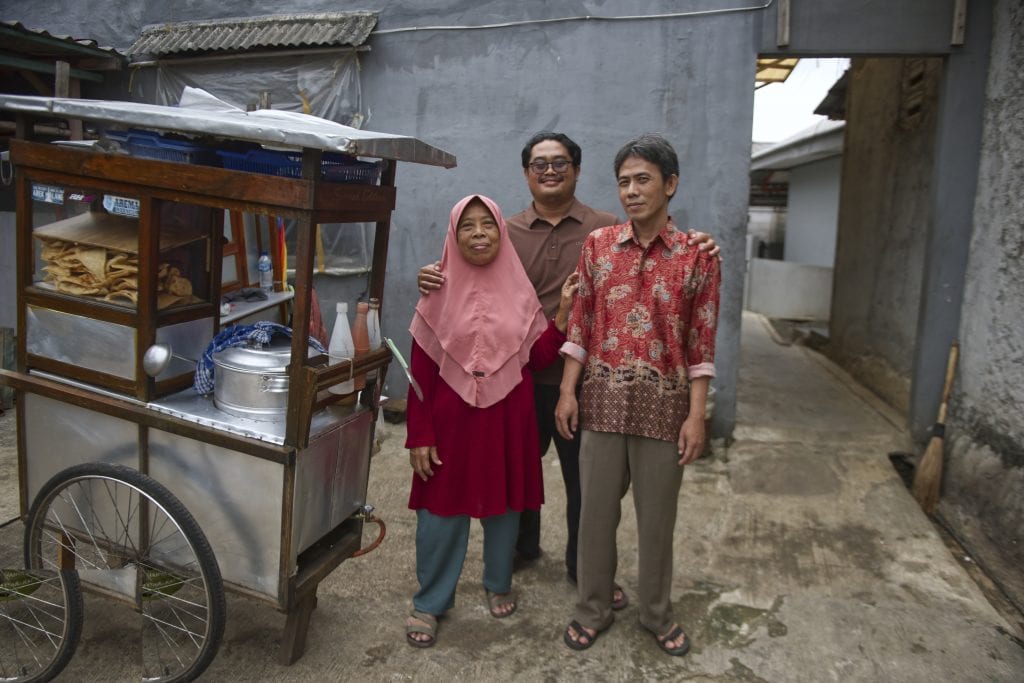
Kuswoyo, a former worker at an asbestos factory in Cibinong, Bogor, Indonesia.
Kuswoyo, a 48-year-old father of two, worked at an asbestos factory in Cibinong, Bogor, Indonesia, for 28 years. Each day, he would mix sacks of raw asbestos and polymers with his bare hands to create asbestos insulation thread.
“We didn’t wear gloves, and we had no masks, even though a notice on the wall said to, they were not provided,” he said.
After 28 years at the Korean-Indonesian joint venture, Kuswoyo and his wife are both left breathless. The factory is in the center of town. Clouds of deadly asbestos dust would fill the workplace and waft out the windows onto the busy streets, shops, and densely populated neighbourhoods.
“In the morning, when we started work at 7 a.m., you could see the dust flying around everywhere,” says Kuswoyo, rubbing his nose and recalling how it hurt to breathe in the fibers all day. “It was everywhere in the room and drifting out the open windows. Everywhere.”
Each afternoon, he and his wife would return home from the factory covered in dust and throw their dirty uniforms in the wash.
“We didn’t know of any danger,” said Kuswoyo. “All my uniforms were taken home and washed with my children’s clothing. We did this for 17 years.”
In 2016, Union Aid Abroad–APHEDA began funding an asbestos eradication program with partner organisation Local Initiative for Occupational Safety and Health Network (LION) to combat the dangers of asbestos and reach out to possible victims.
LION approached the workers at the factory and helped them get medical checks and scans. Someone from the NGO would always accompany Kuswoyo and other workers to the hospital and help with their compensation
applications. Finally, in 2020, two years after being diagnosed with an asbestos-related disease, Kuswoyo received his compensation.
The factory still operates but no longer uses asbestos. Kuswoyo still works there as much as possible. His compensation is not enough to allow him to retire. His wife is also unwell but has not sought treatment. She prefers not to know.
Some days, Kuswoyo is not well enough to go to work and “takes a holiday.” Other days, he has to find a seat to sit and rest between jobs. When heavy work is required, he asks his workmates to help.
Four of his workmates have also been diagnosed with asbestosis. Tuniyah, 64, is one of them. She worked at the same factory for 23 years. At first, the factory supplied industrial masks. Later, the workers just used cloth masks.
“After 10 years at the factory, I became ill,” said Tuniyah. “I didn’t know asbestos could make you ill. I suffered from bad chest pains and a very bad cough that would not go away. I found it hard to breathe. I got short of breath even doing the washing. Every day I went to work, the dust was everywhere.”

Tuniyah has an asbestos-related disease but fought to get a compensation.
In 2010, Tuniyah was diagnosed with lung disease, but the government ministry rejected her claim for compensation until APHEDA partner organisations INA-BAN and LION intervened. Finally, after countless scans and medical examinations over four years, asbestos disease was confirmed, and in 2020, she was awarded $3,000 in compensation.
The Global burden of disease study estimates 1, 662 Indonesians died from asbestos-related diseases in 2020 alone, yet the official figure for people diagnosed with asbestos-related disease in Indonesia is just six workers. No asbestos deaths have been recorded. This is because Indonesia does not have enough doctors and radiologists trained to detect asbestos-related disease.
Dr. Anna Suraya, head of the Scientific Development Unit of the Occupational Doctors Association of Indonesia and a lecturer at Binawan University, is playing a lead role in an APHEDA sponsored training project to change this.
In Kuswoyo and Tuniyah’s case, a new occupational doctor at the company, a colleague of Dr Suraya, trained in detecting asbestos disease, reported both cases to the Labor Ministry in 2018. But Kuswoyo and Tuniyah did not receive compensation until 2020.
“It took quite a long time for LION and the doctor to convince the company to report cases,” said Pupun Supendi, a LION organiser.
“The Labor office worked slowly and tried to shift responsibility,” he said. “Every case of occupational disease is viewed as a ‘disgrace’ or bad image for the department.”
Supendi and his colleague Ajat Sudradjat work in LION organising against asbestos use and helping workers with their compensation cases.

Here’s the corrected text:
Pupun Supendi, a LION organiser, worked with Kuswoyo and Tuniyah to claim compensation for their work and asbestos-related disease.
—
Story and photo by Zoe Reynolds.
The Union Aid Abroad-APHEDA campaign work in Indonesia with LION INDONESIA is supported by many national Australian trade unions, Unions WA, Australian Aid, the Asbestos Safety and Eradication Agency, and the International Ban Asbestos Secretariat.

